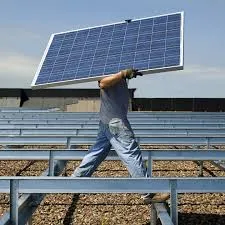Understanding the Dimensions and Efficiency of 72 Cell Solar Panels for Your Needs
The Size of 72-Cell Solar Panels An Overview
In the world of renewable energy, solar power has emerged as a formidable solution to meet the growing energy demands of our planet. Among the various types of solar panels available, the 72-cell solar panel is increasingly popular for residential, commercial, and industrial applications. This article delves into the specifics of 72-cell solar panels, their dimensions, benefits, and considerations for installation.
Understanding 72-Cell Solar Panels
A 72-cell solar panel is designed with 72 solar cells configured in a particular layout to maximize energy production. These cells are typically made from photovoltaic materials, most commonly crystalline silicon, which allows them to convert sunlight into electricity efficiently. The dimensions of a standard 72-cell solar panel are generally around 78 inches long and 39 inches wide (approximately 198 cm by 99 cm), making them larger than the more widely used 60-cell panels.
The larger size of the 72-cell configuration contributes to a higher power output. Typical power ratings for these panels range from 320 to 450 watts, depending on the efficiency of the solar cells, their construction, and other technological advancements. This increased wattage is particularly advantageous for installations where space is limited, as fewer panels are required to meet the same energy needs compared to smaller panels.
Advantages of 72-Cell Solar Panels
1. Higher Efficiency The 72-cell design often leads to better energy efficiency. With more cells, the panel can convert more sunlight into energy, which translates into reduced installation costs when fewer panels are required for the same output.
2. Performance in Low Light Conditions Larger panels tend to perform better in low-light conditions compared to their smaller counterparts. This characteristic is essential for areas that experience frequent cloud cover or shorter sunlight hours during certain seasons.
3. Durability and Longevity Manufacturers typically construct 72-cell solar panels to withstand harsh weather conditions, including heavy winds and snow loads. Many panels come with warranties of 25 years or more, ensuring reliable performance over time.
size of 72 cell solar panel

4. Aesthetic Appeal For residential installations, the larger size often translates into a sleeker look on rooftops, making them visually appealing while providing significant energy benefits.
Considerations for Installation
While the advantages of 72-cell solar panels are compelling, there are several factors to consider before opting for installation
1. Space Requirements Given their larger dimensions, 72-cell panels require more roof space than 60-cell panels. Homeowners and businesses should assess whether their installation site can accommodate the necessary number of panels for optimal energy production.
2. Weight The larger size and increased number of cells also result in a heavier panel. This factor is critical for roof-mounted systems, as the structural integrity of the roof must be evaluated to support the additional weight.
3. Cost Considerations Generally, larger solar panels can be more costly upfront. However, the reduced number of panels needed can offset the total cost of installation. A cost-benefit analysis should be conducted to determine the best choice for a specific project.
4. Inverter Compatibility When choosing a solar panel system, it is vital to ensure compatibility with the inverter. Some inverters may be optimized for specific panel sizes, so consulting with a solar professional can assist in making an informed decision.
Conclusion
In summary, the 72-cell solar panel is an excellent choice for those seeking efficient and powerful solar energy solutions. With their larger size, higher energy output, and durability, these panels can significantly benefit both residential and commercial applications. However, potential buyers should carefully assess their space, budget, and installation requirements before making a decision. Ultimately, moving toward solar energy with 72-cell panels represents a step toward a sustainable and energy-efficient future. As technology continues to advance, the role of solar energy in our energy landscape will only grow more critical, making it essential to choose the right solutions for our diverse energy needs.
-
Unlocking Energy Freedom with the Off Grid Solar InverterNewsJun.06,2025
-
Unlock More Solar Power with a High-Efficiency Bifacial Solar PanelNewsJun.06,2025
-
Power Your Future with High-Efficiency Monocrystalline Solar PanelsNewsJun.06,2025
-
Next-Gen Solar Power Starts with Micro Solar InvertersNewsJun.06,2025
-
Harnessing Peak Efficiency with the On Grid Solar InverterNewsJun.06,2025
-
Discover Unmatched Efficiency with the Latest String Solar InverterNewsJun.06,2025







